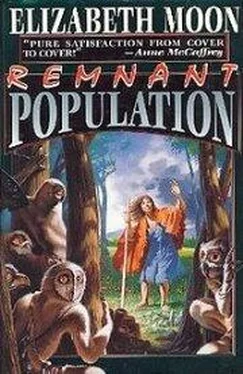She wished she had brought dry clothes; she had not thought how wet she might be, or how stiff. She did not feel free, from having slept on the ground in the open; she felt sticky and miserable, her joints aching sharply. When it finally occurred to her that she could take off the damp garments sticking to her skin, she laughed aloud, then stopped abruptly, a hand to her mouth. Barto had not liked it when she laughed for no reason. She waited, listening; when no voice scolded, she felt her body relax, her hand drop from her mouth. She was safe, at least from that. She peeled the clothes off, peering around to be sure no one watched.
In the dim light, her skin gleamed, paler than anything around it. If someone had stayed behind — if someone were looking — he would know at once she was naked. She did not look at herself; she looked at her clothes as she shook them out. Perhaps she could hang them somewhere. She flinched as a drop of water fell onto her bare shoulder, whirling around at the touch. Then it struck her as funny, and she giggled soundlessly at herself, unable to stop until her sides ached.
That had warmed her. She felt odd, more aware of the air touching her than anything else, but neither hot nor cold. When another drop of water struck her between the shoulders, and trickled down her spine, she shivered. It felt good. She hung her shirt and underclothes over a drooping length of vine, then folded her skirt into a pad to sit on. It was still unpleasantly damp, but it touched her only where she sat, and the heat of her body warmed it. She took out yesterdays flatbread, the chunk of sausage, and ate it hungrily. Today it tasted different, as if it were a strange food, something new. The water in her flask tasted different too, in a way she could not define.
After eating, she dug another little hole and used it. Perhaps she need not — if she was the only person in the world now, who could be offended by her waste? — but lifelong habit insisted that people did something with their output. When she was sure the others had gone — truly gone, forever — she would see if the recycler would work for her. For now she pushed the reddish dirt, the odd-colored leaves, back over the hole.
As the day warmed, Ofelia tired of sitting still; she missed the familiar routine of her days, the gardening and cooking, the chores she had performed so long. It would have been nice to have a fire, to be able to cook, but she had no way to make a fire, and would not risk detection from the smoke. Lacking that possibility, she began picking up sticks, arranging them, almost without thinking. A little platform of crossed sticks, to keep her pack off the damp forest floor. There, a larger fallen limb, its bark already rotted away… it would make a comfortable brace at the back of the next hole she dug. She tidied the little space in which she had settled, arranging it to suit her. It took on more and more the shape and feel of a room, a safe place.
At noon, when the few rays of direct sun fell straight onto her head, she paused to eat again, and look around. Her water flask nestled into the hollow between two roots; she had picked large flat leaves to shade it. Another flat leaf served as a platter for her meal. She had contrived a comfortable seat, after several tries, from limbs propped against each other and a tree trunk, padded with her folded skirt. Her nakedness still bothered her; she felt every movement of the air, even the movements she made. Finally she had pulled on her underclothes, grimacing, a little ashamed to need privacy from nothing but her own awareness, and her shirt over them. She left off the long skirt that now served as a pillow. But her bare feet felt right.
Sometime in the afternoon, a rainstorm came up. In the colony, it had been possible to see storms coming. But under the forest canopy, Ofelia had no warning except the shadow and rush of wind that preceded a downpour. She had been out in rain before; she was not afraid of getting wet. When it was over, she would dry out again.
But she had not been in the forest in a storm before. At first, she heard only the wind, and assumed the water, as the canopy absorbed the first rain. Then the saturated canopy leaked. Just when she thought the rain might be over (light returned, the thunder rumbled in the distance only), this lower rain found her. Drop by drop, drizzling trickle by trickling stream, until she was soaked, as evening came on. Because she had hunched in her improvised seat, the skirt under her was no wetter than before, but also no drier. Her sack of food, covered with large leaves, still seemed damp; the flatcake tasted stale and soggy. She did not want to lie down on the wet forest floor to sleep; she did not want to sit there awake all night either. Finally she rested her head against the tree trunk, and slept fitfully, waking at every unfamiliar sound, By first light, she had decided that she could not stand another wet night in the forest. Not without supplies she had not brought. She wanted to complain to someone, insist that it wasn’t her fault. She had never run away before; she couldn’t be expected to get it all right the first time. Until then, the lack of voices had not bothered her. She had been told her hearing was going… or her mind; Barto couldn’t decide which. She had been able to hear what she wanted to hear, usually; she had often wished for silence. On the rare nights that Barto did not snore, and Rosara did not wake three or four times to stumble noisily to the toilet, she had lain awake reveling in the silence. And the silence of that first day had not bothered her, because she did not hear it as silence. Inside, she had the bickering voices, the public voice that said predictable things, and the new private voice that said unimaginable things. Outside had been the progression of shuttle flight noises, one after another. On the second day, the sound of her own actions — the noises she had made dragging limbs, picking up sticks, breathing and eating and drinking — comforted her without her noticing, mixed as they were with the voices inside.
Not until she wanted an answer did she notice the silence.
It was a wall It was a presence, not an absence… a pressure on her ears that made her swallow nervously, as if that could clear them. Silence wrapped its hands around her head, muffling and smothering. When the panic subsided, she was standing rigid, mouth open, gasping for air… she could not remember what question she had thought to ask, that needed another’s answer. Her ears reported that they had sound enough: rustling in the leaves, the drip of water, that stonelike resonant plonk. But those sounds carried no meaning, and the voices in her head, both the familiar and the new, held silence in her fear. Finally one of them — which, she did not notice — said Go home now . Said it firmly, with no doubts. Ofelia looked around her room, and picked up her folded skirt. She shook it out, and stepped into it without thinking. She picked up the sack of supplies. Time to go home, even before full daylight. Her feet knew the way, through the strands of fog that obscured her vision, over the knotted roots, around the trees and stones. Light grew around her as she came to the edge of the forest, where the lower brush grew, and by the time she came to the edge of the cleared ground, soaked once more with morning dew, she could just see the dark shapes of the town’s buildings through the fading mist. She paused at the edge of that open grassy stretch, calmer now and remembering why she should not simply walk home. Here it was much quieter than in the forest. A breath of air flowed past her, carrying the smell of sheep somewhere to her right. No human sound. No voices. No machines. Would they be waiting for her to return? Was someone in the houses, in the center, holding his breath, watching her through some special machine and waiting for her to come within range? She felt warmth on her right cheek and neck, the sun burning the mist away. Cool damp and warmth alternated, and then the sun won, and bright light shone on the town. Her house lay ahead — she had retraced her path so exactly that if her marks on the dew two mornings before had remained, she might have stepped into them as into familiar socks. But nothing marred the sweep of dull silver. She stepped into the wet grass. She wanted to get home, and out of her wet clothes. She changed from her wet clothes first, and used the bathroom for a hot shower. After that, she considered her clothes. What did she feel like wearing? Indoors… nothing. But she wanted to go into her garden, and she was not yet ready to stay outside naked. She pulled on a shirt. What she wanted to wear with it was short pants, like those she had worn as a child, those she had made for Barto. In his room — not his room, my room she told herself — she found a pair of long pants he had not taken. She found her scissors and cut the legs short, but did not stop to hem them. When she tried them on, they were too big in the waist, but she did not mind the feeling as they rode low on her hips. Better than her underclothes or her skirt. Leaf-nibblers had been at work on the garden in those two days, but all the tomato flowers had opened. Ofelia worked her way from plant to plant, capturing the caterpillars to feed later, breaking the three slimerods she found among the squash, squashing the aphids on the beans. She paid little attention to the time, until her stomach growled and she realized she was hungry.
Читать дальше












